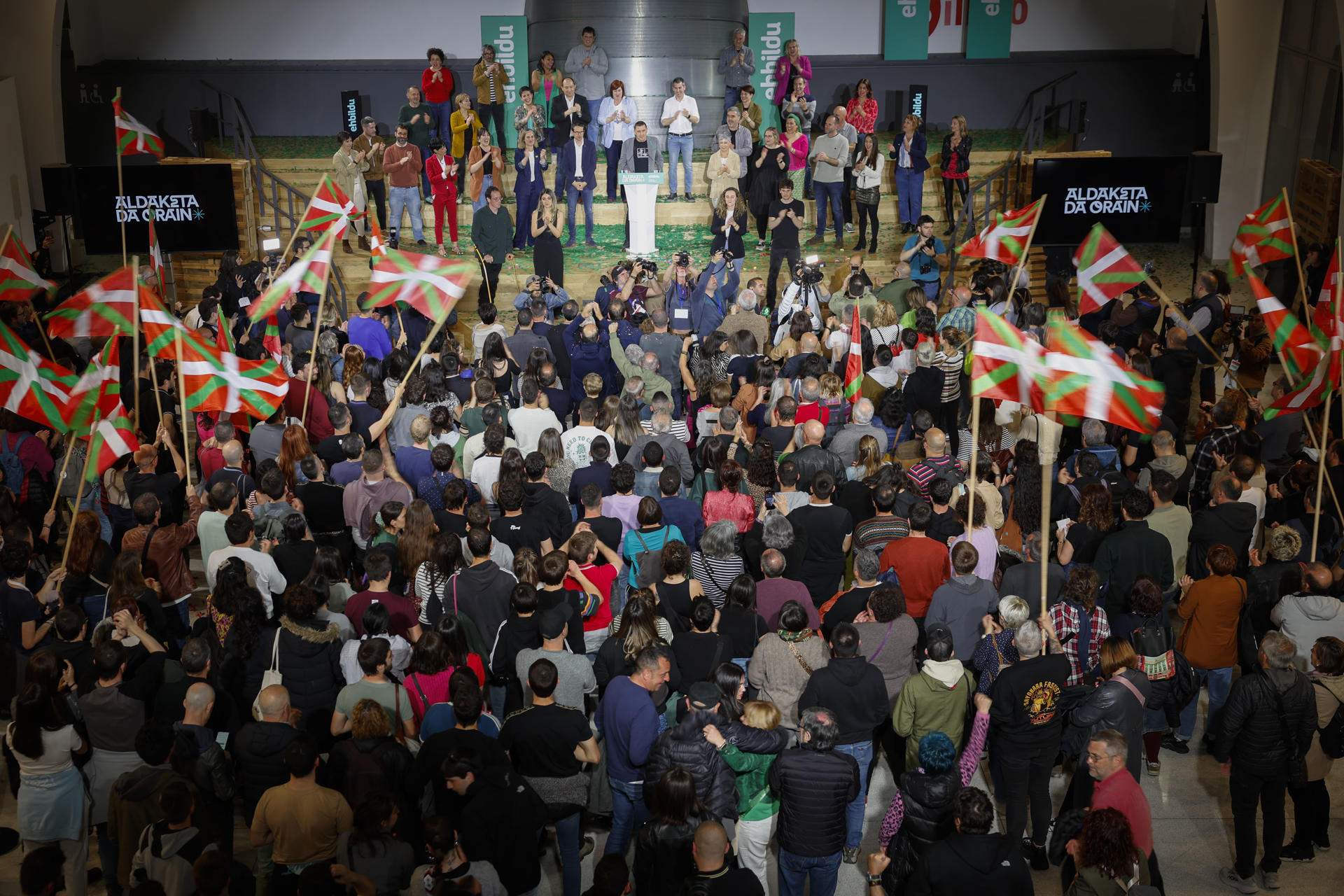Left-wing, pro-independence EH Bildu did not manage to overtake the Basque Nationalists (PNV), the milestone it had dreamed of, in the election to the Basque Country Parliament this Sunday. Bildu, however, did achieve an historic tie with its fellow-Basque rival: both parties won 27 seats. The centre-right PNV finished in first position by a difference of around 30,000 votes. It was a hugely tense election night, with countless moments when Bildu surged ahead on the scoreboard, only to fall behind again. There was, however, one clear certainty throughout the scrutiny: the party headed by leader Arnaldo Otegi and presidential candidate Pello Otxandiano is now, incontestably, the hegemonic force on the left of Basque politics. The final results saw Bildu adding six seats to its total from the last Basque election in 2020, while the PNV lost four. The Basque Socialists (PSE) added two, for a total of 12; the People's Party (PP) also captured an extra seat for a total of seven; while left-wing Sumar enters the Basque chamber with a single representative. Vox, in the end, retained its seat in the Parliament. Podemos has been erased from the Basque political map. Everything indicates that the PNV and the PSE will repeat the governing and legislature agreement they reached four years ago.
Aldaketa da orain ("The change is now") was Bildu's slogan in this election campaign. And, although they did not achieve the first place they longed for, the slogan ended up having a point of truth: the PNV will be able to govern Euskadi with the PSE, but it will no longer be able to boast of the overall hegemony in Basque politics that it has long enjoyed. The first symptom of change became apparent in Bildu's decision to celebrate its election night in Bilbao. It had always followed the scrutiny from Donosti (San Sebastián), the city where it has its political headquarters; an indication that the Basque left party wanted to make itself a central force in Euskadi.
A campaign aiming at first place
Pello Otxandiano's goal of beating the PNV was difficult, but the polls offered encouragement: during the part of the campaign when opinion polls could be published, practically all of them agreed that Bildu was ahead of the Basque Nationalists. And the other big goal, much more complicated for Bildu, was to be sufficiently dominant that the PNV would not have an absolute majority with the Basque Socialists.
Sources from Bildu explained to ElNacional.cat that this scenario would have placed the left-wing party in a very strong position: able to establish itself in the legislature as the only opposition party, as well as the most voted - "just like Feijóo in Madrid" - said these same sources. Because what Bildu had always completely accepted is that it would not govern after this election: the PNV and the Socialists have always had the intention - and have expressed it - to repeat the agreement that kept the presidency in the hands of the centre-right nationalist option. Only the Podemos/Sumar space would have been willing to give its votes to Bildu. Thus, at Bildu they could see clearly that the outgoing Basque Nationalist leader Iñigo Urkullu would end up passing the baton to the party's replacement candidate, Imanol Pradales.
A campaign once again stained by ETA
The first week of the campaign was characterized by the little that happened. Above all, it was overshadowed by Athletic Bilbao's victory against Mallorca in football's Copa del Rey final. Even up until the day of the elections, two weeks days after that match played in Sevilla, there were more flags and shields of the club on display on the streets of Bilbao than electoral propaganda.
The second week of the campaign did, however, get a little more hectic. Pello Otxandiano gave an interview to the SER radio network on Monday night, in which he was asked, simply, if ETA was a terrorist organization. The Bildu candidate was hesitant and showed in that interview that he had not properly prepared his answer. He avoided referring to ETA in those terms, and limited himself to calling it an "armed group".
Not only did the Madrid media smell the blood after this slip-up from Otxandiano, but the PNV also decided in the final stretch of the electoral race to exploit it. At the closing meeting of the campaign, the party president, Andoni Ortuzar, emphasized that, unlike Bildu, they presented themselves in the elections "with their faces uncovered". Be that as it may, the atmosphere in the streets of the Basque Country was never tense during this campaign: not in the large cities like Bilbao and Vitoria, and neither in smaller municipalities.
No sign of a road map to independence
One of the paradoxes of the electoral result of this is that 72% of the deputies of the Basque chamber are sovereignists - they are from parties that assert that the Basque people have the right to decide their political future. Despite this, any understanding between the two parties on progressing towards an objective of independence is completely impossible, due to the weight still borne in Euskadi by the decades of armed struggle that did not end until ETA's definitive ceasefire in 2011. Not only that, but the election of this new parliament comes at a time when support for independence in the Basque Country is at an historic low: a little over 20%, as indicated by several recent demographic studies.

